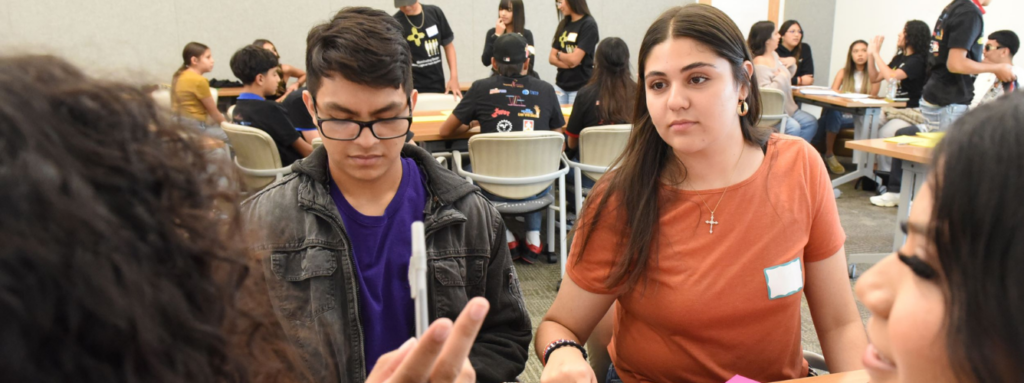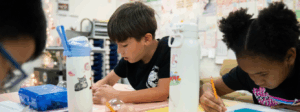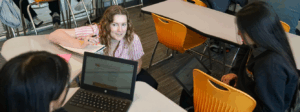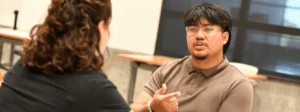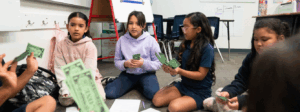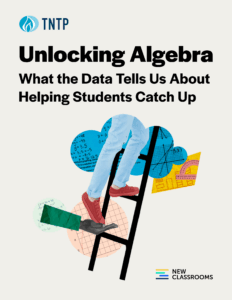At TNTP, we recognize that to prepare young people for the 21st-century workplace, we must change how we approach education to ensure academic and workforce readiness for all young people. For over 25 years, TNTP has worked hand-in-hand with thousands of school districts to tackle their most intractable problems. Today, our work reaches 19 million students across 41 states as we work toward a future where every young person has multiple pathways to achieve short- and long-term economic and social mobility.
In May 2024, TNTP and America Succeeds launched a partnership to expand durable skills development opportunities for all learners. As highlighted by America Succeeds in the Durable Skills Framework, these core competencies—including critical thinking, communication, and adaptability—are transferable across different contexts and remain essential for lifelong learning, career growth, and navigating workforce demands. Through this collaboration, our two organizations have developed research-driven services to help school systems: 1) redefine PK12 readiness measures to encompass both academic and workforce readiness; 2) shift workforce readiness from static technical skills to adaptive, future-proof competencies aligned with the Durable Skills Framework; and 3) expand educational program goals and outcomes through strategic planning, implementation, and progress monitoring support.
The launch of America Succeeds’ latest research, Empowering Learners for School, Work, and Life: Insights from the Research Practice Collaborative (Phase I), is an exciting opportunity for the field to learn more about the critical importance of this work. The report does not focus solely on skills—which we know are important—but instead identifies the core practices that provide young people opportunities to build and apply those skills. This approach leads to deeper student engagement and stronger real-world connections.
Building durable skills requires deliberate practice, ongoing feedback, and chances for real-world application. These competencies are less likely to be acquired through classroom teaching or online courses alone. They develop gradually through practical learning experiences and thoughtful reflection.
Deeper student engagement is achieved when schools use innovative practices to align learning with students’ interests and aspirations (Halverson & Graham, 2019). For example, Gibson Ek High School engages students in interest-driven internships and self-directed projects, fostering intrinsic motivation and targeted skill development.
Stronger real-world connections are built through hands-on experiences such as project-based learning and internships (Zhang & Ma, 2023). Here, “real-world connections” refer to both the applicability of learning to real-world scenarios and building relationships with industry professionals. GO CAPS Monett, for instance, provides opportunities for job shadowing, client projects, and professional mentorships, directly preparing students for career challenges and success.
This approach’s holistic focus sets it apart. It connects learning directly to real-world applications, boosting motivation and understanding. Reflection tools like portfolio-based assessments and competency dashboards empower students to track their growth and refine their skills. Schools embed durable skills into educational programming, including but not limited to curricula, instructional practices, assessments, professional development, student supports, and policies to ensure their relevance and applicability throughout students’ careers.
To effectively prepare students for the future, educators and policymakers must move beyond isolated skill instruction and integrate durable skills into curriculum and programming. This approach equips students with the adaptability to thrive in a rapidly changing economy. Drawing from our learning and engagement, these actions represent critical next steps for educators and policymakers:
- Build Foundational Knowledge: Equip stakeholders, including caregivers, employers, and youth-serving nonprofits, with a foundational understanding of durable skills and their value to foster a shared vision and coherence across communities.
- Build Trustful Relationships: Foster strong community collaboration rooted in mutual respect and transparency, essential to developing the rapport needed for community buy-in.
- Redefine Graduate Readiness: Reflect on and redefine your vision of a graduate to ensure it identifies the durable skills essential for real-world success and workforce demands.
- Develop a Cross-Sector Strategy: Collaborate with schools, local government, businesses, and community stakeholders to create the opportunities that ensure young people gain the skills they need to thrive.
Durable skills bridge the gap between education and workforce readiness, equipping young people with the tools they need to succeed in life and work. America Succeeds’ research provides actionable strategies to embed these skills into educational systems. TNTP is excited by the opportunity to support education leaders in bringing this critical work to life in their specific contexts. To learn more about implementing durable skills in your school, district, or state, please complete this survey or contact Dr. Lara Ohanian at [email protected].
